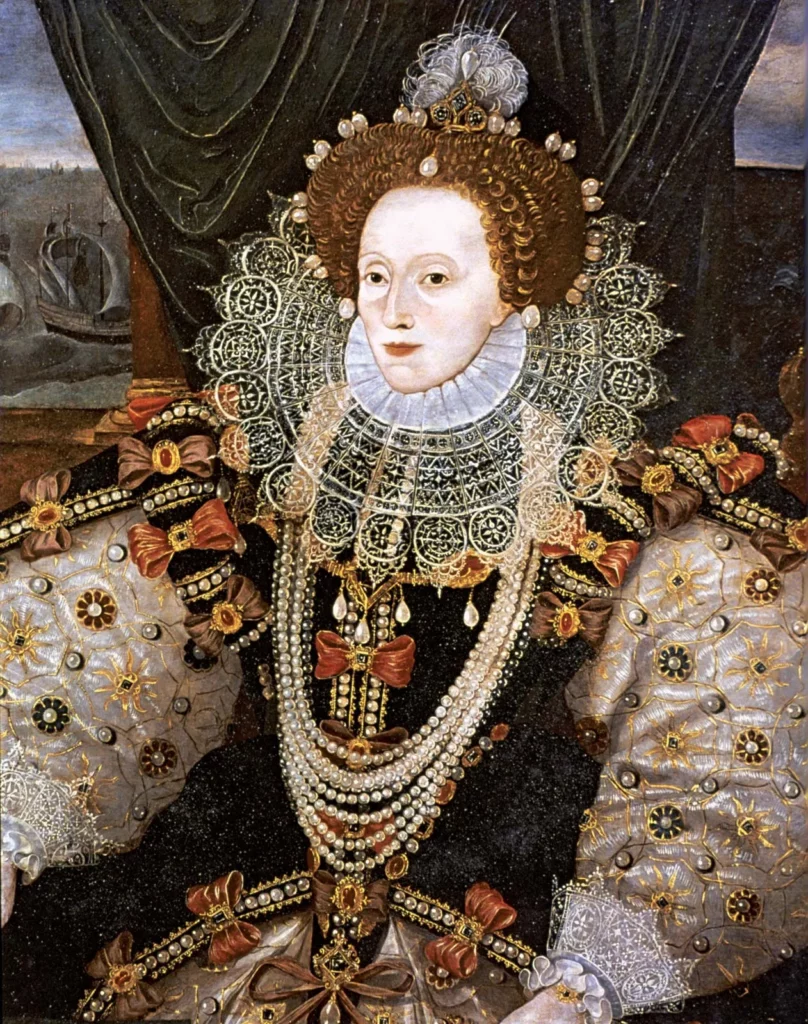Leadership Beyond Gender: 7 Lessons from Elizabeth I- The Queen Who Defined an Era
As we celebrate Elizabeth I's birthday on 7th September every year, we look at leadership beyond gender. Her statement “I have the heart and stomach of a king” reflects her defiance of gender roles and embodies her strength, courage and leadership. It remains an empowering message for today's women who conquer traditional expectations and limitations.
What are the 7 lessons we learn from the Queen who defined an Era?

Elizabeth I’s reign is remembered as a period of glory, progress and national pride. Her leadership saw the rise of England as a global power, the flourishing of arts and culture, and the solidification of Protestantism in England. Though she left no direct heirs, Elizabeth’s legacy has endured through the ages, and she remains one of the most revered monarchs in British history. The Elizabethan Age, named after her, continues to be synonymous with greatness, creativity, and the shaping of the modern British identity.
Born on September 7, 1533, at Greenwich Palace, Elizabeth I of England is one of the most iconic monarchs in history. The daughter of King Henry VIII and Anne Boleyn, her reign not only shaped the future of England but also left an indelible mark on world history. Elizabeth ruled for 44 years, a period known as the Elizabethan Age, a time of immense cultural, political, and military growth that saw England rise as a global power.
The Tudor dynasty was in desperate need of a male successor to maintain stability after Henry’s controversial break from the Roman Catholic Church. Henry VIII, who had married Elizabeth’s mother, Anne Boleyn, had great hopes of securing a male heir. Elizabeth’s arrival as a girl was seen as a disappointment by her father and within three years, her mother, Anne Boleyn, was executed under charges of treason, adultery and incest, a politically motivated move that left Elizabeth motherless.
Her early years were spent largely in obscurity. Elizabeth’s status at court was uncertain after her mother’s execution and she was declared illegitimate. Nevertheless, she received a rigorous humanist education that prepared her well for leadership. Her father’s subsequent marriages produced one half-brother, Edward VI, and one half-sister, Mary I, both of whom ruled before Elizabeth ascended to the throne.
Elizabeth I: Lessons from Her Leadership
Elizabeth I’s life and reign offer timeless lessons for modern women across the globe. In a time when women were expected to be subservient, her defiance of traditional gender roles, fierce independence and intelligence set a powerful example that resonates strongly today. The challenges she faced—both as a woman and a leader—mirror the obstacles many women continue to encounter in modern times, from leadership struggles to balancing personal and professional expectations.
1. Breaking Gender Barriers
Elizabeth ruled in a world where political power was largely the domain of men. She had to navigate the expectations of a patriarchal society that doubted a woman’s ability to govern. However, she used her status as a woman to her advantage, often presenting herself as both nurturing and authoritative, blending the “female” and “male” qualities society assigned to each gender.
Modern women can relate to Elizabeth’s struggle to overcome gender bias in leadership positions. In politics, business, and other professional fields, women are often scrutinized for their leadership styles or forced to choose between being perceived as either too soft or too assertive. Elizabeth’s ability to redefine leadership as uniquely her own—neither wholly masculine nor feminine—teaches women today the value of owning their identity, leading with authenticity, and defying expectations.
2. The Power of Education and Intelligence
From an early age, Elizabeth was known for her intellect, fluent in multiple languages and well-versed in history, philosophy, and politics. Her education was one of her greatest assets, allowing her to outmaneuver many of her male advisors and foreign diplomats.
In modern times, Elizabeth’s emphasis on education and intellectual growth remains a lesson for all women. In a world that increasingly values knowledge and expertise, Elizabeth’s reign underscores the importance of continuous learning and using education as a tool for empowerment. Women in leadership positions often face additional pressure to prove their competence, and education can be a powerful equalizer.
3. Independence and the Value of Self-Reliance
Perhaps one of the most defining aspects of Elizabeth’s reign was her decision to remain unmarried and childless, a radical choice in a time when a woman’s worth was often tied to her marriage and ability to bear children. Despite pressure from her court and international suitors, she refused to be defined by traditional expectations, stating that she was “married to England.” Her decision allowed her to focus solely on her role as queen without being subject to the political manipulations or compromises a royal marriage would have entailed.
For modern women, Elizabeth’s life offers a powerful reminder of the importance of independence. While many women today have the freedom to choose whether to marry or have children, they still face societal pressures to conform to traditional roles. Elizabeth’s ability to define her own path speaks to the necessity of self-reliance and reminds women that their worth is not defined by their marital status or motherhood but by their abilities, ambitions, and personal choices.
4. Resilience at the heart of Leadership
Elizabeth’s reign was not without adversity. She inherited a divided nation, faced numerous assassination attempts, survived internal rebellions, and confronted external threats, such as the Spanish Armada. Through it all, she remained composed, resilient, and decisive. One of her most famous moments came before the Spanish Armada’s invasion when she delivered her iconic speech at Tilbury, saying, “I have the heart and stomach of a king ” This bold declaration reinforced her strength in a moment of crisis and solidified her position as a remarkable leader.
For women today, Elizabeth’s leadership under pressure is a true lesson on resilience. She exemplified grace under fire, showing that resilience and the ability to remain calm and focused in times of turmoil are essential qualities for any leader. Women in modern workplaces and positions of authority continue to face unique pressures, often having to prove themselves repeatedly. Elizabeth’s reign teaches the value of perseverance, confidence, and steadfastness in overcoming challenges.
5. The Power of Image and Presentation
Elizabeth was a master of image-making. Throughout her reign, she carefully cultivated her public persona, using symbolism, portraiture, and courtly rituals to present herself as a divinely appointed ruler. She was acutely aware of the power of perception, and by controlling her image, she commanded respect and maintained her authority.
In the modern age of social media and constant visibility, Elizabeth’s lesson on the power of image is more relevant than ever. Women today, particularly those in leadership or public roles, understand the importance of how they present themselves to the world. Elizabeth’s reign shows that it’s not just about appearance, but about crafting a message that reflects inner strength, purpose, and confidence.
6. Balancing Strength and Compassion
Despite her strong political maneuvering, Elizabeth was also known for her compassionate side, particularly her deep connection with her people. She skillfully balanced being an authoritative ruler with being perceived as a caring mother of the nation. She understood the importance of empathy, often taking time to address her subjects directly, which strengthened her legitimacy as a ruler and fostered loyalty.
For modern women in leadership, this duality of strength and empathy is crucial. The ability to lead with both firmness and compassion allows leaders to build trust and respect, whether in political, business or personal spheres.
7. Celebrating Success
The defeat of the Spanish Armada brought widespread recognition to both England and Queen Elizabeth I. Europe was astonished that a relatively small island nation had successfully defended itself against such a formidable foe. Although the conflict with Spain would continue until 1604, the outcome was no longer certain, and foreign diplomats began seeking England as a potential ally. Elizabeth’s popularity soared, and the victory significantly boosted the nation’s self-confidence.
England’s success was celebrated in countless ways. Songs were composed, medals minted, portraits painted, and prints published—all praising Elizabeth as the steadfast protector of her nation. She shared the glory with the English navy, giving thanks for divine intervention: “God blew and they were scattered.”
Elizabeth’s reign demonstrates that true leadership isn’t about cold authority but about understanding the needs and emotions of those you lead.
Elizabeth I – a True Sovereign
Elizabeth I’s life is a testament to the power of resilience, intellect and independence in the face of enormous challenges. Her reign broke molds, set new standards for leadership, and left a lasting legacy that transcends time. She is often remembered for her refusal to be defined by the limitations imposed on her gender, making her a role model for women striving to carve out their own identities in a world that still presents its share of barriers.
Her story reminds modern women of the importance of inner strength, self-awareness and courage in the pursuit of success, and how embracing one’s true self is the ultimate key to lasting influence and legacy.
Elizabeth I’s declaration, “I know I have the body of a weak and feeble woman, but I have the heart and stomach of a king, and of a king of England too,” is one of the most famous statements of her reign, embodying her political savvy and her ability to navigate the complexities of gender in a male-dominated world. Delivered in 1588 during her speech to the troops at Tilbury as they prepared for the possible invasion by the Spanish Armada, this powerful statement captures not only her unique leadership style but also her understanding of the symbolic role of the monarchy in uniting the nation.
Elizabeth I’s Speech at Tilbury
At the time of this speech, England faced a grave threat. Spain, the dominant Catholic power in Europe, had assembled one of the largest naval forces in history to invade England and overthrow Elizabeth’s Protestant government. The Spanish Armada seemed unstoppable, and England was on the brink of disaster. In the face of this imminent danger, Elizabeth made a bold decision: she personally addressed the troops at Tilbury, rallying them to defend their country and protect their queen.
Wearing armor over a white gown, Elizabeth’s appearance itself was symbolic. She appeared both as a regal monarch and a military leader, a queen willing to risk her own life alongside her soldiers. Her speech was a calculated mixture of vulnerability and strength, acknowledging her physical limitations as a woman while simultaneously asserting her political and spiritual authority as England’s monarch.
A Statement of Gender Defiance
Elizabeth’s words, particularly the line about having the “heart and stomach of a king,” were a direct challenge to the traditional gender roles of her time. In the 16th century, women were largely seen as physically and intellectually inferior to men, unfit for leadership, and certainly not for the battlefield. Elizabeth’s acknowledgment of her “weak and feeble” body reflected this societal perception, but it also allowed her to subvert it. By stating that she possessed the “heart and stomach” of a king—attributes associated with strength, courage, and authority—Elizabeth positioned herself not only as an equal to her male counterparts but as their superior.
This statement of defiance resonated deeply in an era when monarchs were expected to project an image of divine power and invincibility. Elizabeth’s skillful blending of both her womanhood and her kingly authority was revolutionary. She didn’t deny her gender or try to downplay her femininity; instead, she embraced it while elevating herself to the status of a king, embodying both roles at once. This duality was one of the key factors that enabled her to maintain power in a patriarchal society, and it is a lesson modern women can still draw from today—one doesn’t have to deny their identity to succeed in traditionally male-dominated fields.
By invoking the imagery of a king’s heart and stomach, Elizabeth was doing more than asserting her right to rule—she was aligning herself with the core values associated with kingship at the time: courage, resolve, and an unyielding sense of duty. In the 16th century, kings were seen as embodiments of their nation, responsible for the protection, prosperity, and stability of their people. By declaring that she possessed the heart and stomach of a king, Elizabeth was telling her subjects that she was every bit as capable of leading them into battle, making decisions for the good of the nation, and defending England’s sovereignty as any male ruler.
The “heart” symbolized her emotional resilience and unwavering commitment to her people. Despite the many personal and political trials she faced throughout her life, from the execution of her mother to her imprisonment under her sister, Elizabeth remained resolute. Her “heart” represented her loyalty to her country and her vision of a united, stable England.
The “stomach” refers to her fortitude, her inner strength to endure hardship, and her willingness to confront danger. It was a metaphor for the courage required to face not only external threats, such as the Spanish Armada, but also the internal challenges of ruling a divided country. Elizabeth’s reign was marked by religious tension, economic difficulty, and political intrigue, yet her “stomach” for these challenges allowed her to maintain control and guide England into a new era of prosperity.
Leadership Beyond Gender
Elizabeth’s statement also points to a broader theme: leadership qualities that transcend gender. Her assertion that she had the “heart and stomach of a king” emphasized that the qualities necessary for effective leadership—courage, intelligence, decisiveness, and compassion—are not inherently male or female. By aligning herself with the traditional image of a king, Elizabeth made it clear that leadership is about character and action, not biology.
For modern women, this idea remains relevant. Women in leadership positions often face the double standard of having to prove their worth in ways men do not, and they are often judged through the lens of gender. Elizabeth’s defiance of this idea reminds us that effective leadership comes from within—strength of purpose, the ability to inspire others, and the resilience to overcome obstacles are qualities that anyone, regardless of gender, can possess and cultivate.
Elizabeth was a master of rhetoric and her Tilbury speech is one of the most powerful examples of how she used language to solidify her authority. By publicly acknowledging her gender but transforming it into a strength, she preempted any criticism that could be leveled against her for being a woman. She gave her troops a reason to fight not just for England, but for a queen who, despite her “weak and feeble” body, was willing to stand alongside them in battle.
This level of emotional intelligence and strategic communication is a lesson in leadership. Elizabeth’s ability to read her audience, address their concerns, and then inspire them with carefully chosen words is something modern leaders—both women and men—can learn from. The power of speech, when wielded correctly, can rally people to a cause, inspire loyalty, and solidify one’s authority.
Elizabeth I’s statement, “I have the heart and stomach of a king,” has echoed through history as a defining moment of her reign, but it also serves as a lasting testament to her unique approach to leadership. By embracing both her femininity and her kingly authority, Elizabeth showed that strength is not confined to one gender. Her reign demonstrated that leadership comes from courage, intelligence and the ability to rise above societal expectations.
For modern women, her words remain a powerful reminder that they are not defined by their physical form, traditional roles and social conditioning. Women today continue to break barriers in politics, business, science and the arts and there is a lot that we have to change. Elizabeth’s speech is a reminder that every woman is born with the “heart and stomach” of a leader, no matter the field or the challenge.
Do you want to share your story and inspire our readers ? Know that YOUR EXPERTISE is paving the way for a fairer, happier society.




